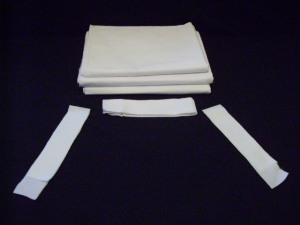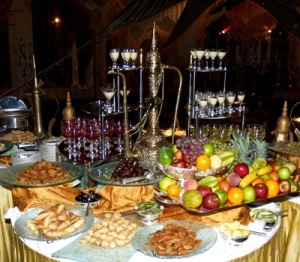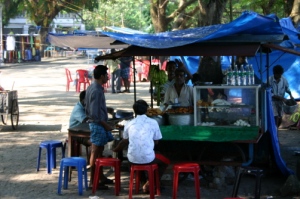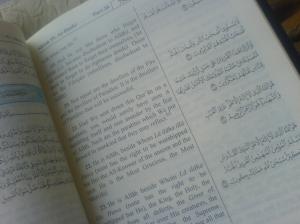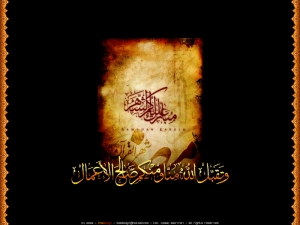There is nothing to do in the mornings of Ramadan. I get up at nine after the late night dinner at four in the morning, the Fajr prayer at 4;45 and an hour or two, of Qur’an recitation, and till around eleven, I just end up walking here and there. Sometimes I try dusting the furniture, sometimes I browse something and sometimes I try rearranging my kitchen and bedroom. But that cannot be done everyday. So after three four days, I end up having nothing to do. It was on one of those days, while simply cleaning the last-week-cleaned shelf, I came across my college magazine, published when I was doing my sixth semester, or third year. I have cherished this magazine, after throwing away all other magazines published during the other three years. I have kept it with me because I was the student editor of it. Titled the ‘Scroll’ with a grey cover, the magazine lay at the bottom of my bookshelf. I still remember the day it got published. I was happy and proud. There was a small speech by the Principal (we call him Princy for short), after which we, I and our staff editor Anila madam, passed the magazine, neatly wrapped, to our Princy. He tore the wrappings on the magazine and held it high for all of us to see it, and then presented it to the guest of honor, I don’t remember the person. I was so proud.

After the event, we returned to our classes and the magazine was distributed in all the classes. The next day, one of my classmates Nisha came to me and asked, “Where is the poem I gave to you? You haven’t published it!”
Yeah, I remember her poem. After I was elected as the student editor for the magazine, I began asking my friends and everyone who I saw on the campus corridor for articles. Nisha was one of the first students to come up with an article. I was pleased with her. She has given me a beautiful poem named as ‘Rashtreeyamen bhoovil’ meaning ‘Politics of My Country’, describing the political situation of present India. I was really wondered to see such a talent in her. I scolded my self for not getting close enough to her to know about the great blessing God have given her. I took it to Anila Madam, for her verification.
“Such a big topic described in such a small and wonderful poem!” Anila madam exclaimed. She was happy to get a good work from her students on the first days of our endeavor.
Days flew by, and within two months we had been loaded with a huge amount of articles from around the college. My book shelf was full of A4 sheets, and so was Anila madam’s table. We burned the midnight oil in our editing process for so many days, selecting the good ones, selecting the not so good ones to be given back and editing the average ones to make it a good one. There were only a few articles that was too good to be edited, one of them the poem of Nisha.
After about three months as the editor, students started asking me where the magazine was (as if a magazine was something you could pluck from a tree!). I was busy running behind it to get ads for it, and get good and affordable printing press and also preparing for my internal exams. Some of them even asked me if I have used the money provided for the magazine by the college to have some dinner party. I kept quite to those mocking questions. They complain of the busy schedule they have when it comes to practicals, records and exams. So why can’t they think about me? I am also having those practicals, records and exams, and also the magazine to do with. Do I have an extra hour in the day that they don’t have? Well, I was under tremendous pressure those days.
After the exams, I started again with my work of the magazine. I have got enough ads with me now, thanks to the ad team and I have found out a good press. Anila madam was also there to help me. We were coming to college after the meeting with the press owner, when Anila madam spoke about her cousin, a well known Malayalam author. I have seen him before at some meetings. He was an old man, may be in his sixties. He was almost bald, and the remaining hair was snow white. There was a pleasance in him with a sweet smile always on his face, and he seemed like a loving grandfather to all.
“Why don’t we ask him to help us with our editing?” She asked.
I thought it was a good idea. He could edit the articles better than us. The next day we fixed an appointment with him, and gave him all the articles. He asked us to come back and collect it the following week.
The next week, I along with my classmate went to meet him to collect the edited work. Anila madam was busy with some work, so she asked me to take someone else with me. We had tea with him and a little chat. He was really a great man with so much of knowledge. I instantly became a fan of him, even though I haven’t read any of his works. After the tea, he introduced his family to us. Then he went inside his library and brought the articles with him.
“Here are your articles. I have edited them all. Some are too good to be edited.” He congratulated the young talented generation of authors and expressed his happiness to see such good budding authors. We were also happy to hear it. He was complimenting our college. We were beaming.
He then took a paper from his pocket, and said, “I haven’t edited this poem. Can you please collect it after two days?”
I noticed the poem by Nisha, and wondered what was there to be edited in such a good poem. But I gave him my consent.
After two days, I went with Anila madam to collect the poem. Aftr the usual salutations, he went inside his library.
He came out with an old magazine. The pages where yellow in color and it broke where ever he bent it. It smelt of cockroaches and there where some silverfish running on it. He turned the pages with utmost care. He stopped at one page, and held the magazine at us. Anila madam took it in her hands while I moved closer to her. The page was yellow in color with letters of the old Malayalam font printed in black, and curiously I looked at the date on the page. August 1970.
There was a poem in it, named ‘Ente Bharatham’ meaning ‘My India’. It was written by the man sitting in front of us. I stared at the lines of the poem and it seemed very familiar. Yeah, the poem by Nisha. This was it.
We both looked at him in shame. But he seemed cool. Anila madam started to apologize for Nisha. But the author never took notice of it. He started speaking, “You know why this student of yours selected this poem for the magazine? Because India still faces the problems it faced in the 60s and 70s. This poem stands true even today.”
He was not angry with Nisha for stealing his poem. I thought he seemed happy that Nisha stole his work. He went on.
“That was my first article that got printed in a magazine. Even though I have forgotten my other works, I never forgot my first published work. It was like my first child.” He started explaining the history during the 60s and 70s.
We had no time for these long lectures, and so we said goodbye to him soon. Anila madam apologized once again for stealing his work. But he was never bothered about it. He asked us to give him a copy of our magazine as soon as it got published. We promised him we will do that.
Days flew by and at last the magazine got published, thanks to the layout team, editing team, finance team and all others who directly and indirectly helped with the work. Phew! I was more than relieved to see that all the problems where over. But I was wrong.
It was on the next day when Nisha came to me and asked me about her poem. There were many of our friends and classmates around us and so I didn’t know what to say to her. Saying that she had copied the work in front of these many students may make our friendship end forever, and make her feel very bad. And to be honest, I was a little weak in such matters. I muttered something about giving it to the press to be published and simply wondered why it was not there. I thought that solved the matter. I still don’t know if I have done the right thing.
Two days later, an office staff came to our class and delivered a notice. ‘The principal wants to meet Najeeba of sixth semester Electronics and Communications Engineering branch’. I saw some fifty pair of eyes turning at me. Usually Princy only calls students who have done something against the rules of college, or somebody who still haven’t paid the fees. Moreover, Princy was the last person we would want to meet in our college life. I felt something stumbling inside my stomach.
When I reached the cabin of my most dreaded Princy, I found I was not alone. There stood Anila madam. So something about the magazine. I thought. May be he is not satisfied with the financial account of the magazine. And yeah, he is not satisfied with anything. I thought.
I asked permission to enter. I stood near Anila madam, and the expression on her face told me that she knew nothing about this enquiry. Princy was looking at some papers and never bothered to look at us for a few minutes.
Without looking at us, he started, “I have got a complaint here against the editors of the magazine.”
A few moments of silence when Princy carried on his paper work.
“What is the complaint, Sir?” asked Anila madam, with as much politeness as she could. I mused in the irony of her politeness, when she shouts at our mischief in the class. We stand in politeness in front of Anila madam, while she stands in politeness in front of the Princy. Wonder where he stands with his head down. May be in front of the Technical Education Officer. And that person in front of – well, I don’t know. I thought I have found a new pyramid here apart from the one I learned at school – The Pyramid of Food Chain. Now, my new discovery will be called The Pyramid of Politeness. The top most part will be for God. And then -
My thread of thoughts was broken by Princy’s voice.
“I got here a complaint from Nisha, that her article was not included in the magazine.”
We were surprised. The thought never even occurred to us. Nisha complaining for not publishing her stolen work! How dare of her! And that too, let alone me, against Anila madam.
Princy looked up at us for the first time, expecting an answer from either of us.
“Sir, her work was a stolen poem sir, from the People magazine dating august 1970.” Anila madam explained.
“Oh, yeah? Where did you get that magazine now?” Seemed princy did not believe what Anila madam said. I became angry with him. What reason does he think he has to believe Anila madam is lying?
“Sir, we edited our articles with the help of …, the famous Malayalam writer. It was his article that she has copied. He gave us the magazine in which the poem was published for verification.”
Anila madam explained. I stood there with my mouth shut. I never dared to talk to this person.
“Well then, you can go.” He dismissed us. It was when I came out that I found I was sweating all over. His cabin seemed too hot. May be because of his high temperature.
“What a girl this Nisha is! Wanting to publish the stolen work!” Anila madam exclaimed.
“Yes, she asked me about her poem the day after the magazine was published.” I said.
“Really?” Anila madam seemed surprised. “What did you say?”
“I didn’t say anything.” I said. “She was my good friend, and so I thought keeping quiet was better.”
“But you were not her good friend,” Anila madam observed, “or she would have not gone to complain about us.”
Yeah, may be. I tried not to humiliate her in front of others, but this is how she paid me back.
“Leave it, Najeeba.” I heard Anila madam consoling me. “Just take it as some of the funs during your college life, for you to smile at your old age.”
“Yes, madam.” I smiled. Actually I was too happy to be out of Princy’s cabin to think about Nisha and her poem. “And keep this between you me and the Principal. Not a word to anybody.”
How nice of her. I wanted to report this incident to all so that they could understand the real nature of Nisha. But Anila madam has put an end to it.
“Yes, madam.” I gave a reluctant consent.
We dispersed into our classes, Anila madam as a teacher and me as a student. Friends came asking me why Principal called me, and I answered it was to ask about some financial matters regarding the magazine. I saw Nisha two benches apart from me, looking at me, happy for her revenge. But a few minutes later, another notice arrived asking Nisha to meet the Princy. I saw her going to meet him, and everyone in our class was surprised. It was rare Princy calling two students of the same class to meet him on the same day. She came back after some fifteen minutes, with her head down. I heard someone asking what the matter was, and she replying something about not paying the fees. The matter was over.
Nisha never spoke to me after the incident, and I never wanted to be the first to speak. So we ended our college life.
All this happened some five years back. I still have contact with Anila madam, she has been retired and now leads a happy life with her children and grandchildren. I heard that Nisha was married to an engineer working at Baba Atomic Research Center, Kanyakumari. She works as a software engineer. I have got her email id with me in our classmates’ database. I send mails and forwards to everyone in the database except to Nisha.
When I was going through the pages of the magazine, a new thought came to me. It is Ramadan, a time to mend broken strings of friendship and family. So I thought, why not send her a mail. With much difficulty I typed one, and sent it to her, with a ‘BCC’ to Anila madam. I took care not to say anything about the incident or the magazine. That was two days back.
Today I received her reply, with photos of her hubby, herself and their cute little princess attached to it. I was so glad to receive it. And there was Anila madam’s reply too, saying that she was very happy to see that we have built up the broken parts of our friendship.
Thank you Ramadan!
